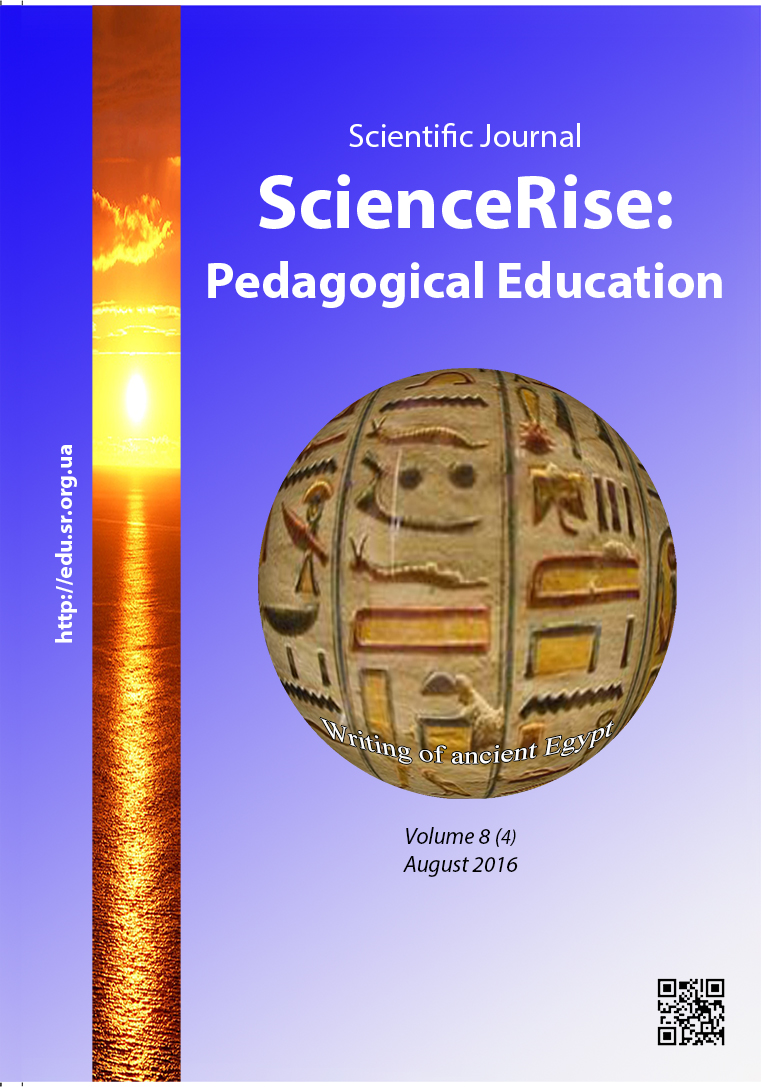The essence and perspectives of implementing acmeological approach into the process of formation of future philologists’ professional subjectness
DOI:
https://doi.org/10.15587/2519-4984.2016.76461Keywords:
acmeological approach, professionalizm, professional subjectness, future philologists, person’s activity, training principles, training methods, research methods, acmeological environment, higher educational establishmentAbstract
The paper specifies the essence and prospects of implementing acmeological approach into the process of formation of future filologists’ professional subjectness. It is found out that implementing acmeological approach into the educational space enables the study of patterns of person’s acmeological development, facilitates the formation of students’ positive and creative attitude towards themselves as well as professional subjectness, readiness to succeed in their future careеr. The author considers training principles and methods of the acmeological approach. The meanings of the concepts „acme”, „professionalism”, „professional”, „acmeological patterns”, „principle of dialogueness”, „person’s activity” which are the key concepts of the acmeological approach based on the analysis of present-day scientists’s research are specified in the article
References
- Antonova, O. Ye.; Ohnev’yuk, V. O. (Ed.) (2011). Akmeolohichnyy pidkhid do vyznachennya sutnosti pedahohichnoyi obdarovanosti. Akmeolohiya – nauka KhKhI stolittya. Kyiv: Kyyivs’kyy un-t imeni Borysa Hrinchenka, 17–22.
- Akimov, S. S. (2011). Primenenie akmeologicheskyh metodov issledovaniya v professional’noi podgotovke bakalavrov tekhnologycheskogo obrazovaniya [The usage of acmeological research methods during professional training of bachelors of technological education]. Young scientist, 9, 196–198.
- Akimova, O. B. (Ed.) (2012). Pedagogycheskaya akmeologiya [Pedagogical acmeology]. Yekaterinbug, 251.
- Biriukova, G. M., Zobnina, T. V. (2010). Metodologicheskie printsypy akmeologicheskogo podhoda k psyhologycheskoi podgotovke studentov pedagogicheskogo universiteta [Methodological principles of acmeological approach to the psychological training of students of pedagogical university]. Scientific proceedings of university named after P. F. Lesgaft, 10 (68), 17–23.
- Derkach, A. A. (Ed.) (2004). Akmeologiya [Acmeology]. Moscow: «RAGS», 424.
- Dubasenyuk, O. A. (Ed.) (2011). Profesiyna pedahohichna osvita: akme-synerhetychnyy pidkhid [Professional pedagogical education: acme-synergetic approach]. Zhytomyr: Vyd-vo ZhDU im. I. Franka, 389.
- Akmeolohichnyy slovnyk [Acmeological dictionary] (2012). Cherkassy: OIPOPP, 28.
- Nikolayesku, I. O. (2012). Praktychni osnovy akmeolohichnoho rozvytku osobystosti v umovakh osvitn’o-informatsiynoho prostoru [Practical bases of acmeological development of personality in terms of educational and informative space]. Cherkassy: OIPOPP, 98.
- Suslova, E. A.; Derkach, A. A. (Ed.) (2008). Metodologiya i metody psyhologo-akmeologicheskogo issledovaniya [Methodology and methods of psychological and acmeological research]. Moscow: Izd-vo RAGS, 158.
- Yl’yn, E. P. (2012). Psykhologiya vzroslosti [Psychology of adulthood]. Saint-Petersburg: Piter, 544.
- Kremin’ V. H. (Ed.) (2008). Entsyklopediya osvity [Encyclopedia of education]. Kyiv: Yurinkom Inter, 1040.
- Pidkasistyi P. I. (Ed.) (2010). Psykhologiya i pedagogika [Psychology and pedagogics]. Moscow: Izdatel’stvo Yurait; Vysshee obrazovanie, 714.
- Kolesnychenko, N. Yu. (2014). Profesiyna pidhotovka bakalavriv romano-hermans’koyi filolohiyi: analiz kontseptual’nykh zasad problemy [Professional training of bachelors of Romance and Germanic phylology: analysis of conceptual bases of the problem]. Problems of present-day pedagogical education, 44, 13–137.
- Ol’hovaia, T. A. (2007). Stanovlenie sub’ektnosti studentov universiteta [Formation of subjectness of university students]. Orenburg, 430.
Downloads
Published
How to Cite
Issue
Section
License
Copyright (c) 2016 Nataliia Aristova

This work is licensed under a Creative Commons Attribution 4.0 International License.
Our journal abides by the Creative Commons CC BY copyright rights and permissions for open access journals.
Authors, who are published in this journal, agree to the following conditions:
1. The authors reserve the right to authorship of the work and pass the first publication right of this work to the journal under the terms of a Creative Commons CC BY, which allows others to freely distribute the published research with the obligatory reference to the authors of the original work and the first publication of the work in this journal.
2. The authors have the right to conclude separate supplement agreements that relate to non-exclusive work distribution in the form in which it has been published by the journal (for example, to upload the work to the online storage of the journal or publish it as part of a monograph), provided that the reference to the first publication of the work in this journal is included.








